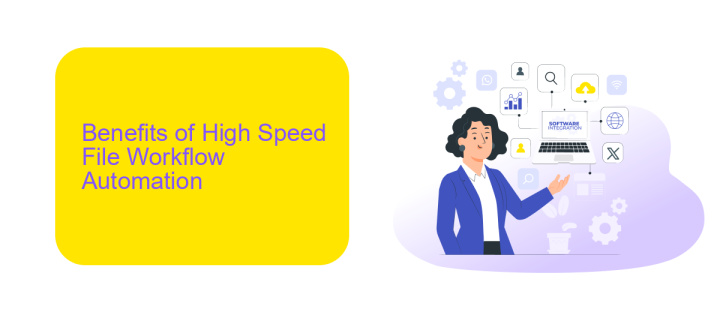High Speed File Workflow Automation
In today's fast-paced digital world, efficient file management is crucial for maintaining productivity and ensuring seamless operations. High-speed file workflow automation offers a transformative solution by streamlining processes, reducing manual intervention, and accelerating data handling. This article explores the key benefits and implementation strategies of adopting automated workflows to enhance organizational efficiency and drive business success.
Introduction
In today's fast-paced digital landscape, the need for efficient and high-speed file workflow automation has never been more critical. Businesses are constantly seeking ways to streamline their operations, reduce manual tasks, and enhance productivity. High-speed file workflow automation offers a solution by enabling seamless file transfers, rapid data processing, and real-time collaboration.
- Improved efficiency and speed
- Reduced human error
- Enhanced data security
- Scalability and flexibility
- Cost savings
One of the key components of successful file workflow automation is the integration of various tools and services. Platforms like ApiX-Drive facilitate this by providing easy-to-use solutions for connecting different applications and automating data transfers. With ApiX-Drive, businesses can set up integrations quickly, ensuring that their file workflows are automated and optimized for maximum efficiency. This not only saves time but also allows teams to focus on more strategic tasks, driving overall business growth.
Benefits of High Speed File Workflow Automation

Implementing high speed file workflow automation significantly enhances operational efficiency by reducing manual intervention and minimizing human errors. Automating file workflows streamlines repetitive tasks, allowing employees to focus on more strategic activities. This leads to faster processing times and improved accuracy, ultimately boosting productivity and reducing operational costs.
Moreover, high speed file workflow automation facilitates seamless integration across various platforms and services. Tools like ApiX-Drive enable businesses to easily connect and synchronize data between different applications, ensuring smooth data flow and real-time updates. This not only enhances collaboration but also provides better visibility and control over processes, allowing for quicker decision-making and improved overall performance.
Key Features and Capabilities

High Speed File Workflow Automation offers a robust set of features designed to streamline and optimize your file management processes. By leveraging advanced technology, it ensures that tasks are completed efficiently and accurately, reducing the need for manual intervention and minimizing errors.
- Automated File Transfers: Schedule and automate file transfers to ensure files are moved or copied at the right time, reducing delays and manual workload.
- Real-Time Monitoring: Keep track of file movements and workflow status in real-time, allowing for immediate action in case of any issues.
- Seamless Integration: Utilize services like ApiX-Drive to easily integrate with various applications and platforms, ensuring a smooth data flow across your ecosystem.
- Customizable Workflows: Tailor workflows to meet specific business needs, ensuring that processes are optimized for maximum efficiency.
- Security and Compliance: Ensure that all file transfers and workflows comply with industry standards and regulations, providing peace of mind and data integrity.
By incorporating these key features, High Speed File Workflow Automation significantly enhances productivity and operational efficiency. Whether handling large volumes of data or complex workflows, this solution provides the tools needed to manage tasks seamlessly and effectively.
Implementation and Integration

Implementing high-speed file workflow automation requires a strategic approach to ensure seamless integration with existing systems. The first step is to analyze the current workflow and identify bottlenecks that can be optimized through automation. This involves understanding the types of files being processed, the frequency of file transfers, and the specific requirements of each task.
Once the analysis is complete, the next step is to select appropriate tools and platforms that facilitate automation. ApiX-Drive is a versatile service that can be utilized to set up and manage integrations efficiently. It allows for the automation of data transfers between various applications, ensuring that files are moved and processed with minimal human intervention.
- Analyze current workflow and identify bottlenecks
- Select tools and platforms for automation
- Utilize ApiX-Drive for seamless integration
- Test and refine the automated workflow
After setting up the automation, it is crucial to conduct thorough testing to ensure that all processes run smoothly. Continuous monitoring and refinement of the workflow will help in maintaining efficiency and addressing any issues that arise. By leveraging tools like ApiX-Drive, businesses can achieve significant improvements in their file processing capabilities.
- Automate the work of an online store or landing
- Empower through integration
- Don't spend money on programmers and integrators
- Save time by automating routine tasks
Case Studies and Best Practices
One notable case study involves a media production company that significantly improved its file workflow automation using ApiX-Drive. The company faced challenges in managing large volumes of video files, which required seamless integration between various cloud storage and editing platforms. By implementing ApiX-Drive, they automated file transfers, metadata tagging, and notifications, reducing manual intervention and errors. This integration not only accelerated their production timelines but also enhanced collaboration among remote teams, leading to a 30% increase in productivity.
Another best practice example is from a legal firm that needed to streamline document management across multiple departments. They leveraged ApiX-Drive to automate the synchronization of files between their internal systems and client portals. This integration ensured that all stakeholders had real-time access to the latest documents without the need for repetitive manual uploads. The result was a more efficient workflow, improved accuracy in document handling, and a significant reduction in administrative overhead. These case studies highlight the transformative impact of high-speed file workflow automation in diverse industries.
FAQ
What is High Speed File Workflow Automation?
How can I implement High Speed File Workflow Automation in my organization?
What are the benefits of High Speed File Workflow Automation?
Can High Speed File Workflow Automation be customized to fit specific business needs?
What tools are available for setting up High Speed File Workflow Automation?
Apix-Drive will help optimize business processes, save you from a lot of routine tasks and unnecessary costs for automation, attracting additional specialists. Try setting up a free test connection with ApiX-Drive and see for yourself. Now you have to think about where to invest the freed time and money!


